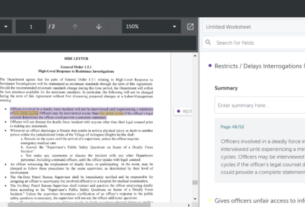Eleven prominent international law firms have formed a first-of-its-kind consortium to build a series of on-demand and interactive training programs in generative AI for lawyers and legal professionals, and the courses are now being offered to other firms on a subscription basis as they are released over the coming months.
The series of courses, called Generative AI Fundamentals for Law Firms, are being developed to address issues such as generative AI privacy and security concerns, implications of data bias, ethical considerations, liability and accountability, and the essential skills for collaborative interdisciplinary work with data scientists and IT professionals.
To develop the courses, the consortium is working with SkillBurst Interactive, a company that provides on-demand learning programs for law firms and corporations.
Law firms in the consortium include Eversheds Sutherland, Hogan Lovells, Norton Rose Fulbright, Taft, Thompson Coburn, and Womble Bond. Other firms declined to disclose their participation.
SkillBurst, which in June launched its Legal Innovation Lab led by Anusia Gillespie, former co-head of innovation at Eversheds, said it received “an overwhelming call” from law firms for vendor-independent training on the fundamentals of generative AI in legal practice.
It began developing the courses after conducting a confidential survey of executives and lawyers at the firms, collecting data from them on the topics they considered most important and the risks they were most concerned about. Consortium firms will continue to influence training topics, content, messaging and priorities, SkillBurst said.
Based on that input, SkillBurst has already developed the first two modules in the training: “Generative AI: Facts and Foundations” and “Generative AI Security: An Overview of Risks and Solutions.” Going forward, two additional modules will be released each month to participating firms.
Available By Subscription to Other Firms
Starting today, firms that are not members of the consortium can purchase subscription access to the training programs.
“Every lawyer needs training on generative AI, but it is so new that high-quality and contextualized training for lawyers is not yet widely available,” said Gillespie. “These firms are investing in and creating on-demand learning content that scales and will benefit the profession at large.”
Although Anusia declined to provide specific pricing, she said it is based on firm size and subscription term, with terms available up to three years. There are six tiers of subscriptions, based on the numbers of lawyers in the firm.
The price is by the firm, which means that subscribing firms are free to offer the training to anyone in the firm; they do not need to add individual users or seats.
SkillBurst can host the courses or deliver SCORM files for law firms to host on their own internal learning management system.
Potential Transformative Impact
Rachel Broquard, service excellence partner at Eversheds, a member of the consortium that is developing the training, told me during an interview last week that, soon after the first wave of generative AI products came out, her firm was excited about its potential transformative impact.
“Our purpose is to help our clients, our people and our communities to thrive. and if technology can help us do that in a better way, then we want to look into that and see how we can take advantage of the opportunities,” she said.
But while believing it important for professionals in the firm to understand how to use the technology, she also saw it as critical that they understand its risks and how to mitigate them.
“Part of our duty of care to our clients to make sure that we’re using technology in the right way, in a way that is in line with the requirements that are imposed on us, either ethically or from a regulatory perspective.”
To that end, the firm decided that it needed a training program that would help its professionals and staff broadly to get an understanding of the technology, with the understanding that there would be communities within the firm that would dive into it on a deeper level.
“This is something that everybody, no matter what level they are at, should be able to engage with.”
In her experience, Broquard said, the place where digital transformation projects are most likely to fail is with the people and change management.
“I think that 70% to 80% of any digital transformation project is all about the people. That’s why it’s absolutely critical that we, as an organization, spend time in upskilling everybody across our organization, because the technology is no good if people don’t know how to use it or don’t want to use it or are worried about using it.”
Katrina Dittmer, director of legal technology at Eversheds, said that part of the value she sees in the SkillBurst training, specifically, is that it provides a shared understanding of and vernacular for generative AI.
“When we have conversations with colleagues, with clients, when we use a term, we’re grounded in what that term means and what the implications are,” Dittmer said. “We thought that SkillBurst gives us a way to level-set that at a speed that would be difficult for us to achieve on our own.”
Asked why the firm decided to develop this training through the SkillBurst consortium rather than on its own, Broquard said it was a combination of speed of delivery and subject matter expertise.
“This offering seemed like a really smart way of approaching what were trying to achieve quickly and drawing on some expert resource outside our organization. I think that’s the way that many law firms are approaching this. We don’t necessarily have all the expertise internally and therefore we do need to partner with experts outside the organization who can help us move forward.”
“I think there’s huge amounts of benefits [in AI] for both clients and for lawyers actually doing the work in embracing this technology,” Broquard added, “provided that they know how to do that in a safe way and in a way that enhances value to everybody around.”


